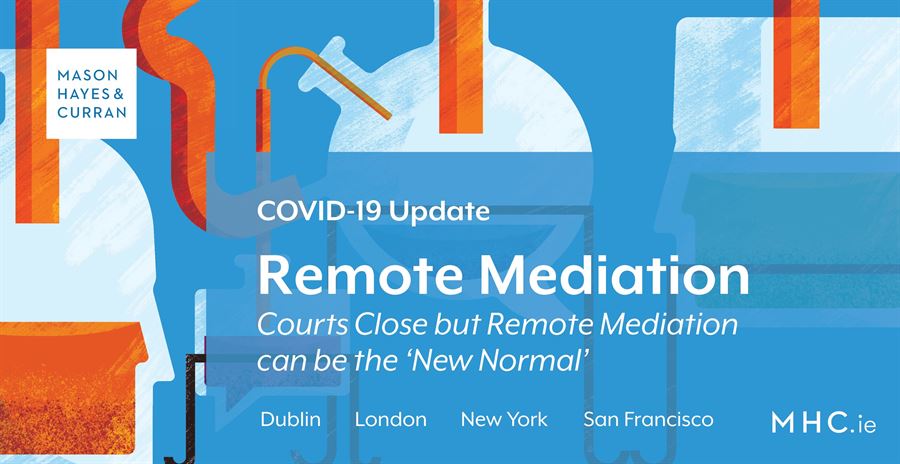
We are living and working in unprecedented times. For now, the COVID-19 pandemic has changed the way we live and work, but we have adapted.
Disputes can be resolved remotely and we have embraced technology that allows us to continue to serve our clients to the highest standards.
Court closures – unchartered waters
The operation of the courts has been scaled back and refined during this pandemic. The changes mean that only urgent cases, and cases not involving witnesses, will go ahead in the coming weeks.
At the time of writing, the following measures have been announced and will be reviewed before 12 April 2020: 
-
The Supreme Court and Court of Appeal will adjourn any appeal listed for hearing, where consent has been given. New dates will be fixed for hearing when the COVID-19 situation improves. Where there is no consent to adjourn, the court will adjourn the appeal unless there is a particular urgency
-
No new cases or trials will begin in the High Court and will be adjourned. All motions in all lists, including before the Master of the High Court are adjourned. Judges are available to hear urgent applications for certain types of business (bail, extradition matters, habeas corpus, wardship, injunctions and urgent applications for Judicial Review). There is no need to attend court for consent orders in any matters; an email exhibiting each party’s consent with the record number and details of the relevant list can be sent to hcmotions@courts.ie
-
No new jury trials will commence this term in the Circuit Court until the next court term. District Court appeals will be remanded after 10 June 2020. Family law lists and civil lists, including personal insolvency matters, will be adjourned to a date after 20 April 2020. Urgent applications can be submitted to the relevant Circuit Court Office
-
Only urgent matters will continue to be heard in District Court sitting throughout the country. Urgent matters include certain criminal law, family law and child care law matters. Other cases can be treated if a good case can be made.
The situation is evolving and the measures remain under review by the Courts Service of Ireland. Following the latest announcement by the government on 27 March 2020 of further restrictive measures, it is likely that we will see further announcements from the Courts Service. Indeed, on Sunday 29 March 2020, it was announced that court offices will be open for essential business by appointment only and that members of the public and legal practitioners will not be served at a court office without an appointment. Only urgent applications which cannot be dealt with by email or post will be given an appointment.
Courts are beginning to make use of online filing, and we may well see the courts adapt and make use of technology to ease the disruption. Last month saw the UK Supreme Court and the Court of Appeal make history by hearing cases by video conference.
Most recently, the Chief Justice and the Presidents of each Court Jurisdiction published a public statement on 31 March 2020, following a remote meeting planning for the continuation of the essential elements of the administration of justice during the COVID-19 pandemic and in the future. It was reported that a significant amount of court administration is now being facilitated electronically and that a considerable amount of work has been done to put in place the ICT infrastructure necessary to facilitate remote court hearings. An initial systems trial will be conducted in the immediate future and will be expanded if successful – so watch this space!
This restricted courts service is unprecedented and has far reaching implications for those with proceedings before the courts. Where a matter is not considered to be urgent, it will not be heard by the courts for the time being. As the situation is evolving, there is no certainty as to when the courts service will be back up and running. We await future statements on whether the pilot facility of remote hearings is successful and will be rolled out in time for the new Court Term commencing on 20 April 2020. We also must be aware that the wide scale adjournments will bring about knock on delays in the coming months.
Remote mediation – the new normal
As the vast majority of us follow government advice to work remotely, it has emerged in recent weeks that dispute resolution can be easily facilitated by way of remote mediation.
Many people will be familiar with mediation – a form of alternative dispute resolution where parties agree to meet with an independent third party who mediates their dispute. Any settlement is completely voluntary, but the mediator can assist in communications between the parties and helps to progress the matter. This is usually done in person, but can very easily be facilitated remotely in the current climate.
Embracing technology, including video conferencing tools, allows for remote mediation. This mirrors in-person mediation as closely as possible. These tools allow the mediator to invite all participants to a virtual meeting. When participants arrive at the virtual location, the mediator can re-direct them to separate ‘rooms’ so that lawyers and their clients can speak together privately. The mediator can drop in and out to speak to the different parties in different rooms, can create additional meeting rooms if certain people wish to speak directly to one another or can allow for everyone to attend the one virtual room - akin to a boardroom - for a direct conversation. Other than physical presence, and the communal coffee pot!, this allows for the very same level of communication. Everyone can be sitting in their own homes, down the street or on the other side of the world. Features like screen sharing allow parties to review documents together.
For those that cannot access video conferencing tools, for example where a stable internet connection is not available, teleconferencing provides an alternative.
Many have reported that success rates for remote mediations are similar to or better than mediations conducted in person. Remote mediation is often less expensive and more time efficient, cutting out travel time and expenses. The major advantage it offers during the COVID-19 crisis is, of course, the protection of public health while we continue to work.
Can this work for your dispute?
Those familiar with mediation will be aware of its many benefits – such as avoiding the cost and delays of a full court hearing. It also allows for confidentiality and for ongoing business relations, if desirable. Avoiding delay will be a key consideration during this pandemic, while courts continue to scale back operations.
In reality, many disputes resolve before going to trial. There is no reason why disputes which are ready to be resolved cannot continue to do so remotely. For example in medical negligence litigation, which can be prolonged, complex and involve issues of great sensitivity, engaging in remote mediation can prove very helpful in the current climate.
With COVID-19, it is inevitable that contract terms will be broken. Mediation can facilitate quick, nuanced and practical solutions, aligning parties’ interests through revising contracts responding to the changing circumstances and maintaining continuity of business, where possible.
Our team will be able to advise you on whether remote mediation can work for you.
How we can help
Our lawyers have adapted to this “new normal” and continue to work remotely as efficiently as ever. We can advise clients as to how to progress their disputes during this unprecedented time. We continue to provide legal and practical guidance and can steer you through this unfamiliar territory.
We keep the security of all the technology we use under review, and can explain the steps we take to protect you. We have access to systems, which are extremely user-friendly and we can guide you through each step of the process.
For more information on effective means of progessing litigation during the COVID-19 crisis, click here
To find out more about how we can help, please contact a member of our Dispute Resolution team.
The content of this article is provided for information purposes only and does not constitute legal or other advice.
Share this:






